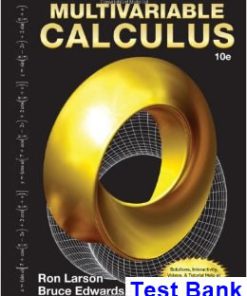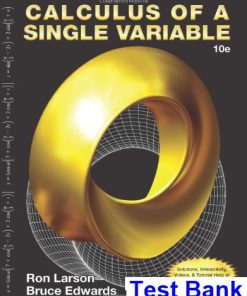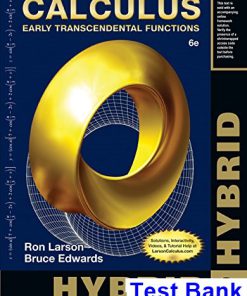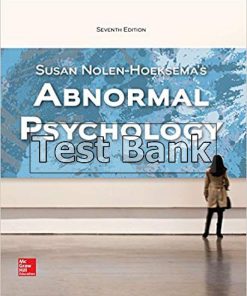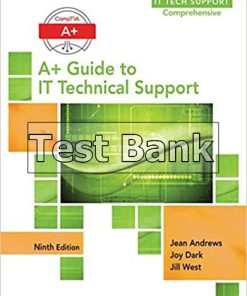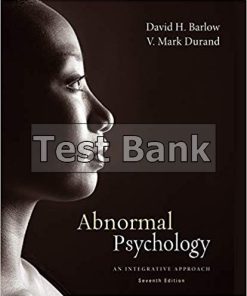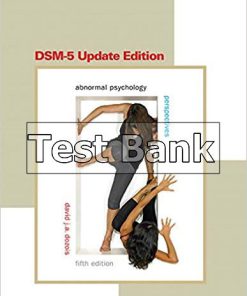Calculus Hybrid 10th Edition Larson Test Bank
You may also like
-
$26.50
$50.00 -
$26.50
$50.00
Calculus Hybrid 10th Edition Larson Test Bank
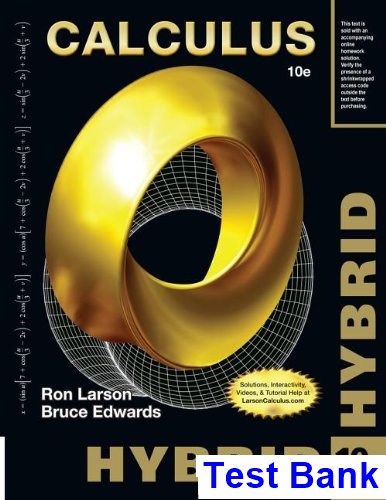
Product details:
- ISBN-10 : 1285095006
- ISBN-13 : 978-1285095004
- Author: Dr. Ron Larson
Larson’s CALCULUS HYBRID’ Tenth Edition’ delivers the same solid and effective pedagogy as his market-leading hardcover text’ CALCULUS’ Tenth Edition’ combined with a briefer paperback format that engages students online with Enhanced WebAssign. The HYBRID demonstrates Larson’s commitment to revolutionizing the way instructors teach and students learn material by moving all the end-of-section exercises from the text online as well as incorporating more real-world applications’ ongoing review’ and innovative technology. Each new Larson CALCULUS HYBRID includes immediate student access to Enhanced WebAssign. Widely praised by a generation of students and professors for its solid and effective pedagogy’ the Larson CALCULUS program is known for addressing the needs of a broad range of teaching and learning styles and environments. Each title is just one component in a comprehensive calculus course program that carefully integrates and coordinates print’ media’ and technology products for successful teaching and learning.
Table contents:
- Chapter QP: Quick Prep Topics
- QP.1: Definition and Representations of Functions (14)
- QP.2: Working with Representations of Functions (14)
- QP.3: Function Notation (14)
- QP.4: Domain and Range of a Function (14)
- QP.5: Solving Linear Equations (14)
- QP.6: Linear Functions (17)
- QP.7: Parabolas (13)
- QP.8: Factoring Quadratic Equations and Finding x-intercepts of a Quadratic Function (14)
- QP.9: Polynomials (17)
- QP.10: More about Factoring Polynomials (14)
- QP.11: Finding Roots (14)
- QP.12: Dividing Polynomials (14)
- QP.13: Rational Functions (17)
- QP.14: Root Functions (17)
- QP.15: Rationalizing the Numerator or Denominator (12)
- QP.16: Exponential Functions (14)
- QP.17: Logarithmic Functions (17)
- QP.18: Trigonometric Functions and the Unit Circle (14)
- QP.19: Graphs of Trigonometric Functions (14)
- QP.20: Trigonometric Identities (17)
- QP.21: Special Functions (14)
- QP.22: Algebraic Combinations of Functions (14)
- QP.23: Composition of Functions (14)
- QP.24: Transformations of Functions (14)
- QP.25: Inverse Functions (17)
- Chapter 0: Preparation for Calculus
- 0.1: Graphs and Models (61)
- 0.2: Linear Models and Rates of Change (73)
- 0.3: Functions and Their Graphs (67)
- 0.4: Fitting Models to Data (31)
- 0: Review Exercises
- 0: Problem Solving
- Chapter 1: Limits and Their Properties
- 1.1: A Preview of Calculus (22)
- 1.2: Finding Limits Graphically and Numerically (61)
- 1.3: Evaluating Limits Analytically (71)
- 1.4: Continuity and One-Sided Limits (59)
- 1.5: Infinite Limits (55)
- 1: Review Exercises
- 1: Problem Solving
- Chapter 2: Differentiation
- 2.1: The Derivative and the Tangent Line Problem (63)
- 2.2: Basic Differentiation Rules and Rates of Change (74)
- 2.3: Product and Quotient Rules and Higher-Order Derivatives (77)
- 2.4: The Chain Rule (72)
- 2.5: Implicit Differentiation (57)
- 2.6: Related Rates (56)
- 2: Review Exercises
- 2: Problem Solving
- Chapter 3: Applications of Differentiation
- 3.1: Extrema on an Interval (56)
- 3.2: Rolle’s Theorem and the Mean Value Theorem (61)
- 3.3: Increasing and Decreasing Functions and the First Derivative Test (56)
- 3.4: Concavity and the Second Derivative Test (59)
- 3.5: Limits at Infinity (69)
- 3.6: A Summary of Curve Sketching (53)
- 3.7: Optimization Problems (63)
- 3.8: Newton’s Method (46)
- 3.9: Differentials (50)
- 3: Review Exercises
- 3: Problem Solving
- Chapter 4: Integration
- 4.1: Antiderivatives and Indefinite Integration (80)
- 4.2: Area (71)
- 4.3: Riemann Sums and Definite Integrals (62)
- 4.4: The Fundamental Theorem of Calculus (99)
- 4.5: Integration by Substitution (75)
- 4.6: Numerical Integration (60)
- 4: Review Exercises
- 4: Problem Solving
- Chapter 5: Logarithmic, Exponential, and Other Transcendental Functions
- 5.1: The Natural Logarithmic Function: Differentiation (70)
- 5.2: The Natural Logarithmic Function: Integration (87)
- 5.3: Inverse Functions (66)
- 5.4: Exponential Functions: Differentiation and Integration (83)
- 5.5: Bases Other than e and Applications (79)
- 5.6: Inverse Trigonometric Functions: Differentiation (68)
- 5.7: Inverse Trigonometric Functions: Integration (86)
- 5.8: Hyperbolic Functions (90)
- 5: Review Exercises
- 5: Problem Solving
- Chapter 6: Differential Equations
- 6.1: Slope Fields and Euler’s Method (69)
- 6.2: Differential Equations: Growth and Decay (72)
- 6.3: Separation of Variables and the Logistic Equation (84)
- 6.4: First-Order Linear Differential Equations (69)
- 6: Review Exercises
- 6: Problem Solving
- Chapter 7: Applications of Integration
- 7.1: Area of a Region Between Two Curves (77)
- 7.2: Volume: The Disk Method (67)
- 7.3: Volume: The Shell Method (56)
- 7.4: Arc Length and Surfaces of Revolution (63)
- 7.5: Work (41)
- 7.6: Moments, Centers of Mass, and Centroids (55)
- 7.7: Fluid Pressure and Fluid Force (26)
- 7: Review Exercises
- 7: Problem Solving
- Chapter 8: Integration Techniques, L’Hopital’s Rule, and Improper Integrals
- 8.1: Basic Integration Rules (66)
- 8.2: Integration by Parts (75)
- 8.3: Trigonometric Integrals (57)
- 8.4: Trigonometric Substitution (68)
- 8.5: Partial Fractions (55)
- 8.6: Integration by Tables and Other Integration Techniques (65)
- 8.7: Indeterminate Forms and L’Hopital’s Rule (78)
- 8.8: Improper Integrals (75)
- 8: Review Exercises
- 8: Problem Solving
- Chapter 9: Infinite Series
- 9.1: Sequences (50)
- 9.2: Series and Convergence (48)
- 9.3: The Integral Test and p-Series (41)
- 9.4: Comparisons of Series (35)
- 9.5: Alternating Series (46)
- 9.6: The Ratio and Root Tests (47)
- 9.7: Taylor Polynomials and Approximations (35)
- 9.8: Power Series (40)
- 9.9: Representation of Functions by Power Series (37)
- 9.10: Taylor and Maclaurin Series (43)
- 9: Review Exercises
- 9: Problem Solving
- Chapter 10: Conics, Parametric Equations, and Polar Coordinates
- 10.1: Conics and Calculus (56)
- 10.2: Plane Curves and Parametric Equations (43)
- 10.3: Parametric Equations and Calculus (57)
- 10.4: Polar Coordinates and Polar Graphs (60)
- 10.5: Area and Arc Length in Polar Coordinates (55)
- 10.6: Polar Equations of Conics and Kepler’s Laws (42)
- 10: Review Exercises
- 10: Problem Solving
- Chapter 11: Vectors and the Geometry of Space
- 11.1: Vectors in the Plane (53)
- 11.2: Space Coordinates and Vectors in Space (64)
- 11.3: The Dot Product of Two Vectors (53)
- 11.4: The Cross Product of Two Vectors in Space (43)
- 11.5: Lines and Planes in Space (65)
- 11.6: Surfaces in Space (44)
- 11.7: Cylindrical and Spherical Coordinates (62)
- 11: Review Exercises
- 11: Problem Solving
- Chapter 12: Vector-Valued Functions
- 12.1: Vector-Valued Functions (48)
- 12.2: Differentiation and Integration of Vector-Valued Functions (51)
- 12.3: Velocity and Acceleration (48)
- 12.4: Tangent Vectors and Normal Vectors (53)
- 12.5: Arc Length and Curvature (54)
- 12: Review Exercises
- 12: Problem Solving
- Chapter 13: Functions of Several Variables
- 13.1: Introduction to Functions of Several Variables (42)
- 13.2: Limits and Continuity (47)
- 13.3: Partial Derivatives (56)
- 13.4: Differentials (43)
- 13.5: Chain Rules for Functions of Several Variables (41)
- 13.6: Directional Derivatives and Gradients (46)
- 13.7: Tangent Planes and Normal Lines (42)
- 13.8: Extrema of Functions of Two Variables (49)
- 13.9: Applications of Extrema (48)
- 13.10: Lagrange Multipliers (40)
- 13: Review Exercises
- 13: Problem Solving
- Chapter 14: Multiple Integration
- 14.1: Iterated Integrals and Area in the Plane (60)
- 14.2: Double Integrals and Volume (54)
- 14.3: Change of Variables: Polar Coordinates (47)
- 14.4: Center of Mass and Moments of Inertia (45)
- 14.5: Surface Area (40)
- 14.6: Triple Integrals and Applications (47)
- 14.7: Triple Integrals in Other Coordinates (43)
- 14.8: Change of Variables: Jacobians (42)
- 14: Review Exercises
- 14: Problem Solving
- Chapter 15: Vector Analysis
- 15.1: Vector Fields (48)
- 15.2: Line Integrals (47)
- 15.3: Conservative Vector Fields and Independence of Path (40)
- 15.4: Green’s Theorem (42)
- 15.5: Parametric Surfaces (43)
- 15.6: Surface Integrals (43)
- 15.7: Divergence Theorem (31)
- 15.8: Stokes’s Theorem (34)
- 15: Review Exercises
- 15: Problem Solving
- Chapter 16: Additional Topics in Differential Equations (online only)
- 16.1: Exact First-Order Equations (42)
- 16.2: Second-Order Homogeneous Linear Equations (47)
- 16.3: Second-Order Nonhomogeneous Linear Equations (43)
- 16.4: Series Solutions of Differential Equations (26)
People also search:
Calculus Hybrid 10th
Calculus Hybrid 10th pdf
Calculus Hybrid 10th download scribd
Calculus Hybrid 10th pdf free
Calculus Hybrid 10th ebook


